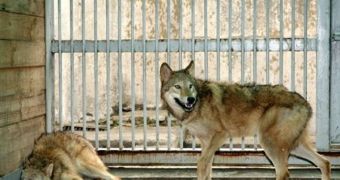A South Korean cloning expert has recently announced that a new scientific study will have two cloned wolves mate, in order to test if they can bring to life viable offspring. This type of experiment is unprecedented in the history of cloning, and will most likely shed some light on the way modified genetic factors behave when transmitted from parents to cubs.
Lee Byeong-Chun, a researcher at the Seoul National University, says that the parts of the experiment will be Snuwolffy, a female wolf clone, born in October 2005, and Minguk, a male clone born in August 2006. The two animals are of the right age, and the researchers have announced their enthusiasm that the pair will be able to create a full litter next year. “This experiment is aimed at verifying the cloned wolves' reproductive ability,” the scientists have told AFP.
At the moment, the two wolves are not present at the same location, but plans are that the male will be shipped to the Seoul Grand Park zoo in April, where Snuwolffy is currently housed. They will be placed in the same cage, following a sufficient period of accommodation. If this process is rushed, then the two could come to hate each other, and would fight every time they are brought together. “Following a period of familiarisation, they will be put together in one cage early next year for mating,” Lee adds.
The team behind the new project is highly-capable of carrying out this sort of experiment, as they are the people generally credited with the first successful cloning of a dog. In 2005, they created the world's first canine clone, an Afghan hound named Snuppy. He and other cloned females managed to successfully breed last year, giving birth to a few cubs. “We'll check whether the cloned wolves can also breed like cloned dogs,” Lee explains.
If their research succeeds, it could pave the way for new processes of resurrecting similar extinct species. Up to this point, offspring created by cloned animals have been very rare, and even when the beasts do get pregnant, they miscarry or give birth to dead cubs. The new study is also very important, as it provides much-needed insight into the genomes of the resulting creatures, which will also help Japanese scientists in their strife to clone a mammoth using an elephant as a host.

 14 DAY TRIAL //
14 DAY TRIAL //